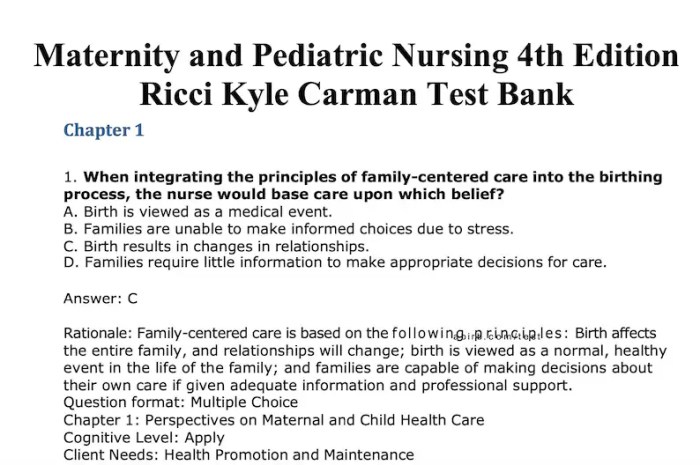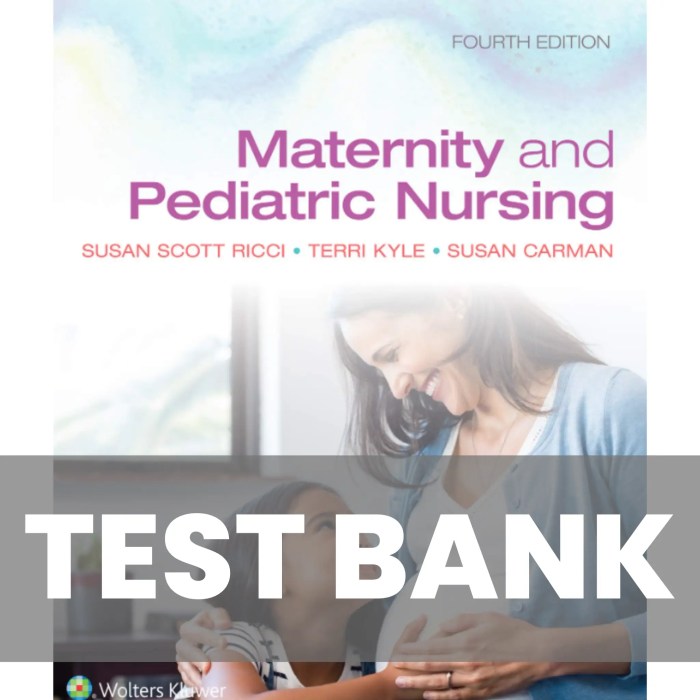Maternity and pediatric nursing 4th edition ricci study guide – Welcome to the comprehensive guide to ‘Maternity and Pediatric Nursing, 4th Edition’ by Ricci, your ultimate resource for excelling in this specialized field. This study guide will provide an in-depth exploration of the key concepts, theories, and nursing interventions that shape the care of women, children, and adolescents throughout their healthcare journey.
As you delve into this guide, you will gain a thorough understanding of the physiological, developmental, and psychological aspects of maternity and pediatric nursing. The evidence-based practices and case studies will equip you with the knowledge and skills to provide compassionate and effective care to your patients.
Key Concepts and Theories in Maternity and Pediatric Nursing: Maternity And Pediatric Nursing 4th Edition Ricci Study Guide
Maternity and pediatric nursing are specialized fields of nursing that focus on the care of women, children, and adolescents. These fields are based on a number of key concepts and theories that guide nursing practice.
One of the most important concepts in maternity and pediatric nursing is the concept of family-centered care. This concept recognizes that the family is the primary unit of care and that the nurse’s role is to support the family in providing care for the woman, child, or adolescent.
Another important concept in maternity and pediatric nursing is the concept of developmental care. This concept recognizes that children and adolescents are constantly developing and that their needs change as they grow and mature. The nurse’s role is to provide care that is tailored to the developmental needs of the child or adolescent.
In addition to these key concepts, there are a number of theories that guide nursing practice in maternity and pediatric nursing. These theories include:
- Theories of attachment
- Theories of cognitive development
- Theories of moral development
- Theories of family systems
These theories provide a framework for understanding the needs of women, children, and adolescents and for developing nursing interventions that are tailored to meet those needs.
Historical Evolution of Maternity and Pediatric Nursing
Maternity and pediatric nursing have evolved significantly over the years. In the early days of nursing, women and children were often cared for by midwives and other lay caregivers. As the field of nursing developed, specialized training programs were created for nurses who wanted to care for women and children.
In the 20th century, there was a growing recognition of the importance of family-centered care and developmental care. This led to the development of new nursing models and interventions that were designed to meet the needs of women, children, and families.
Today, maternity and pediatric nursing are recognized as essential components of the healthcare system. Nurses in these fields play a vital role in providing care for women, children, and adolescents and in promoting their health and well-being.
Nursing Care During Pregnancy and Childbirth

Nursing care during pregnancy and childbirth focuses on providing support and care to women during this important time in their lives. Nurses play a vital role in educating women about pregnancy and childbirth, providing emotional support, and managing any complications that may arise.
Physiological and Psychological Changes During Pregnancy
During pregnancy, a woman’s body undergoes a number of physiological and psychological changes. These changes include:
- Increased blood volume
- Enlarged uterus
- Increased heart rate
- Weight gain
- Mood swings
- Fatigue
Nurses play an important role in monitoring these changes and providing support and education to women during pregnancy.
Stages of Labor and Delivery
Labor and delivery is a complex process that can be divided into three stages:
- First stage: This stage begins with the onset of contractions and ends with the full dilation of the cervix.
- Second stage: This stage begins with the full dilation of the cervix and ends with the birth of the baby.
- Third stage: This stage begins with the birth of the baby and ends with the delivery of the placenta.
Nurses play a vital role in supporting women during each stage of labor and delivery.
Nursing Interventions Used to Support Women During Pregnancy and Childbirth
Nurses use a variety of interventions to support women during pregnancy and childbirth. These interventions include:
- Providing education about pregnancy and childbirth
- Providing emotional support
- Monitoring the woman’s vital signs and the baby’s heart rate
- Administering medications
- Performing episiotomies
- Assisting with the delivery of the baby
Nurses play a vital role in ensuring that women have a safe and positive pregnancy and childbirth experience.
Management of Common Complications During Pregnancy and Childbirth
There are a number of complications that can occur during pregnancy and childbirth. These complications include:
- Preeclampsia
- Gestational diabetes
- Premature birth
- Postpartum hemorrhage
Nurses play a vital role in managing these complications and ensuring that the woman and baby are safe.
Nursing Care of the Newborn and Infant

Nursing care of the newborn and infant focuses on providing care for the newborn and infant during the first few weeks of life. Nurses play a vital role in assessing the newborn’s health, providing care, and educating the parents about newborn care.
Physical and Developmental Characteristics of the Newborn and Infant, Maternity and pediatric nursing 4th edition ricci study guide
Newborns and infants have a number of unique physical and developmental characteristics. These characteristics include:
- Small size
- Immature immune system
- Rapid growth and development
Nurses play an important role in monitoring these characteristics and providing care that is tailored to the newborn’s and infant’s needs.
Nursing Interventions Used to Care for Newborns and Infants
Nurses use a variety of interventions to care for newborns and infants. These interventions include:
- Assessing the newborn’s health
- Providing care for the newborn
- Educating the parents about newborn care
Nurses play a vital role in ensuring that newborns and infants have a healthy start in life.
Management of Common Health Problems in Newborns and Infants
There are a number of common health problems that can occur in newborns and infants. These health problems include:
- Jaundice
- Respiratory distress syndrome
- Necrotizing enterocolitis
Nurses play a vital role in managing these health problems and ensuring that the newborn and infant are safe.
Role of the Nurse in Promoting Infant Development
Nurses play a vital role in promoting infant development. Nurses can promote infant development by:
- Providing a nurturing environment
- Encouraging parent-infant interaction
- Providing education about infant development
Nurses can help to ensure that infants have a healthy start in life and reach their full developmental potential.
Top FAQs
What is the focus of maternity and pediatric nursing?
Maternity and pediatric nursing focuses on the care of women, children, and adolescents throughout their healthcare journey, encompassing pregnancy, childbirth, infancy, childhood, and adolescence.
How does Ricci’s study guide enhance understanding of maternity and pediatric nursing?
Ricci’s study guide provides a comprehensive overview of the key concepts, theories, and nursing interventions in maternity and pediatric nursing, supported by evidence-based practices and case studies.
What are the key topics covered in this study guide?
This study guide covers a wide range of topics, including the physiological and psychological changes during pregnancy and childbirth, nursing care of the newborn and infant, nursing care of the child and adolescent, and health promotion and disease prevention in maternity and pediatric nursing.